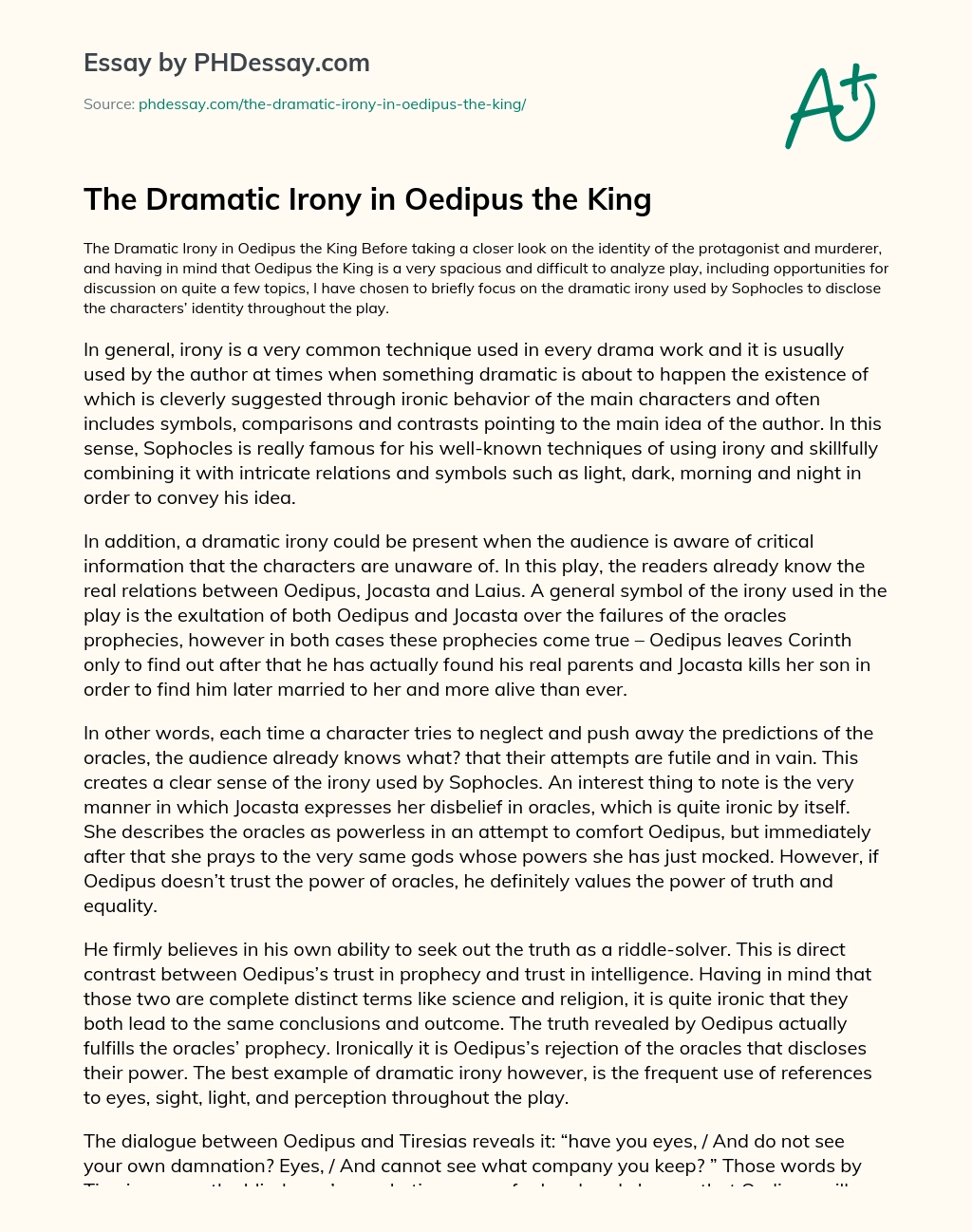Imagine walking through life, completely oblivious to your own deepest, darkest secret. This isn’t a nightmare, it’s the very essence of the play, Oedipus the King, by Sophocles. This timeless tragedy is not just about a man who unknowingly kills his father and marries his mother. It’s about the cruel irony of fate, the pain of ignorance, and the devastating consequences of not seeking the truth. The story is riddled with dramatic irony, a literary technique where the audience knows something that a character doesn’t.

Image: phdessay.com
The audience, from the very first lines of the play, is privy to the truth that Oedipus is, in fact, the murderer of King Laius, his own father, and married to his mother, Jocasta. Oedipus, however, is blissfully unaware of this devastating truth, a truth that will ultimately destroy him. This dramatic tension, this gap in knowledge, creates a chilling, heart-wrenching experience. We watch Oedipus, filled with righteous anger, search for the killer, all the while knowing he is the very person he seeks.
Unraveling the Thread of Fate
The play is a tapestry woven with threads of dramatic irony. From the moment we are introduced to Oedipus, the King of Thebes, we see him as a righteous, compassionate leader, determined to solve the plague that afflicts his city. But we, the audience, know that the plague’s root cause is Oedipus’s own crime, his unwitting act of patricide. Every moment he vows to find the perpetrator becomes a chilling echo of his own guilt.
As Oedipus interrogates Tiresias, the blind prophet, seeking answers to the plague, the irony intensifies. We know the prophet sees the truth, but Oedipus is too blinded by his own pride and conviction to understand the prophecy’s grim implications. He insults Tiresias, calling him a liar, unwilling to acknowledge the truth that stares him in the face.
The Burden of Knowledge
The audience bears the heavy weight of knowledge, witnessing Oedipus’s descent into despair, his relentless pursuit of the truth, all the while knowing the truth he seeks will only shatter his world. We watch as Oedipus questions his own mother, Jocasta, unaware that she is also his true mother, drawing out intimate details of Laius’s death that directly connect to Oedipus himself. The play is a cruel dance of knowledge and ignorance.
The irony is not merely in the audience’s awareness of the truth. It’s in the way Sophocles uses Oedipus’s own words and actions against him. The king’s self-assuredness, his vow to find the truth and bring justice to Thebes, ironically leads him directly to his own downfall. Each step he takes towards justice is a step towards his own destruction.
A Mirror to Our Own Blindness
The play’s power lies in its ability to mirror our own human flaws. Oedipus’s tragedy is not simply a story of a man trapped by fate, but a reflection of the human tendency to resist the truth, to blind ourselves to what we don’t want to see. His story forces us to confront our own capacity for self-deception and the consequences of clinging to ignorance.
Sophocles explores the painful paradox of seeking the truth. We see how Oedipus’s relentless pursuit of truth only leads him to a horrifying revelation that shatters his world. This exploration of the truth’s dangerous allure resonates with us today. We too, in our own lives, often face difficult choices about what truths we want to confront and the ones we choose to ignore.

Image: freebooksummary.com
The Shadow of Fate
The Oedipus the King is a play that speaks powerfully about the role of fate in our lives. Oedipus is a man plagued by a series of prophecies and events that ultimately lead to his downfall. His actions, however well-intentioned, seem to be predetermined by a higher power, a force beyond his control. This theme of fate versus free will, of being guided by destiny, is a profound exploration that resonates deeply with the human psyche.
While some may argue that Oedipus is a victim of circumstance, of a series of unfortunate events, his own arrogance and pride play a significant role in his demise. His refusal to accept the truth, his inability to look beyond his own ego, ultimately leads him to his tragic end.
Learning from the Tragedy
Oedipus’s tragedy teaches us the importance of questioning our own assumptions and seeking the truth, even when it’s painful. It reminds us that the truth, though sometimes harsh, is ultimately liberating. The play is a potent reminder that we must face our own shadows, acknowledge our own flaws, and strive to see the world as it truly is, not as we wish it to be.
Dramatic Irony In Oedipus The King
The Legacy of Oedipus
The tragedy of Oedipus continues to resonate across centuries. The play’s timeless themes of fate, free will, truth, and self-deception have earned it a place as one of the greatest works of Western literature. The character of Oedipus, a man caught in a web of irony and circumstance, has become an enduring symbol of human fallibility and the tragic consequences of our actions.
As audiences continue to engage with the story, we are reminded that the search for truth is a journey of self-discovery. It’s a journey that requires courage, honesty, and a willingness to confront the shadows that lie within. The enduring power of Oedipus the King lies in its ability to provoke thought, to challenge our assumptions, and to guide us towards a deeper understanding of ourselves and the world around us.






